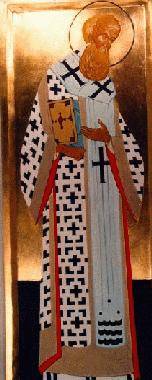The Early Christians Believed in the Real Presence
| "So then, brethren, stand firm and hold to the traditions which you were taught by us, either by word of mouth or by letter." (2 Thes. 2:15) "And what you have heard from me before many witnesses entrust to faithful men who will be able to teach others also." (2 Tim. 2:2) |
INTRODUCTION
Many Catholics and non-Catholics alike think that the Roman Catholic Church invented the doctrine of transubstantiation. Transubstantiation means that the bread and wine presented on the altar at the Mass become the the Body and Blood of Christ by the power of the Holy Spirit at the consecration. The consecration is the time when the priest calls upon the Holy Spirit to change the bread and wine into Christ's Body and Blood. However, the Body and Blood retain the appearance of bread and wine. The Roman Catholic Church, that is, the Latin Rite Catholic Church, and other Catholic Churches in communion with Rome believe that the Eucharist is the Real Presence of Jesus Christ, body, blood, soul and divinity. The Orthodox Churches and most other Churches of the East do so as well. Anglican [Episcopalian] and other Protestant denominations have interpreted Christ's presence at the celebration of the Lord's Supper or Eucharist to be either only spiritual, or symbolic, or non-existent. Thus, I decided to research what the Early Christians believed on this issue. I searched the indices for "Eucharist" in many volume sets on Early Christian writings, and I was astonished at my discovery. The Early Christians actually took the Real Presence for granted. It doesn't even seem as if there was much debate. I could not find anyone who denied the Real Presence of Our Lord in the Blessed Sacrament before the year 500 A.D. Following are the results of my search. Some Christians, e.g. St. Augustine, had very much to say about the Real Presence of Our Lord, so I did not include everything. Also, I want you to know that I did not include other Christians who believed in the Real Presence in this article because they later fell away from the Church for different reasons. Therefore, even though these Christians defended the Real Presence, e.g. Origen, Tertullian, Theodore of Mopsuetta, etc., I did not include their statements. I pray that this research article will inspire lukewarm Catholics to become excited about their Faith which has faithfully been passed on for over 2000 years. I pray that the Holy Spirit will grant you Faith to believe in Our Lord in the Blessed Sacrament and to receive Him at Mass and visit Him in the tabernacle. He is patiently waiting for you because he loves you and wants you to come home. Also, I pray that this research article will motivate non-Catholics to ask questions about the Blessed Sacrament to learn more. Our Lord is still with us in the flesh, and He is awesome! I pray that someday you will be able to experience the joy of receiving Him in the Mass and of praying at his feet.
 THE BIBLE
THE BIBLE
"The cup of blessing which we bless, is it not a participation in the blood of Christ? The bread which we break, is it not a participation in the body of Christ? Because there is one bread, we who are many are one body, for we all partake of the one bread."-1 Cor. 10:16-17
"For I received from the Lord what I also delivered to you, that the Lord Jesus on the night when he was betrayed took bread, and when he had given thanks, he broke it, and said, 'This is my body which is for you. Do this in remembrance of me.' In the same way also the cup, after supper, saying, 'This cup is the new covenant in my blood. Do this, as often as you drink it, in remembrance of me.' For as often as you eat this bread and drink the cup, you proclaim the Lord's death until he comes. Whoever, therefore, eats the bread or drinks the cup of the Lord in an unworthy manner will be guilty of profaning the body and blood of the Lord."-1 Cor. 11:23-27
THE DIDACHE
The Didache or "The Teaching of the Twelve Apostles" is a manuscript which was used by 2nd century bishops and priests for the instruction of catechumens. Many early Christian writers have referenced it making this document relatively easy to date."Let no one eat and drink of your Eucharist but those baptized in the name of the Lord; to this, too the saying of the Lord is applicable: 'Do not give to dogs what is sacred'".-Ch. 9:5 "On the Lord's own day, assemble in common to break bread and offer thanks; but first confess your sins, so that your sacrifice may be pure. However, no one quarreling with his brother may join your meeting until they are reconciled; your sacrifice must not be defiled. For here we have the saying of the Lord: 'In every place and time offer me a pure sacrifice; for I am a mighty King, says the Lord; and my name spreads terror among the nations.'"-Ch 14
And so much more: http://www.therealpresence.org/eucharst/father/a5.html

No comments:
Post a Comment